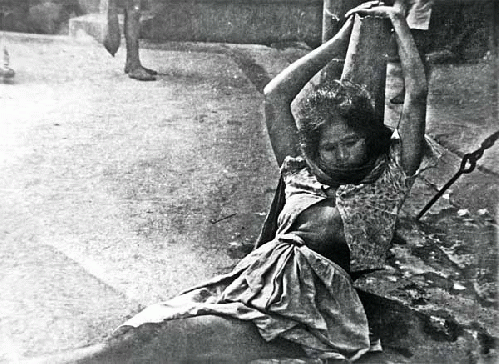Readings for 4th Sunday in Advent: IS 7:10-14; PS 24 1-6;ROM 1: 1-7; MT 1: 18-24.
As we know, rape in the military is a huge problem. According to Amy Ziering's award-winning film, "The Invisible War," more than 20% of female veterans have been sexually assaulted while serving in the armed forces. In 2009 alone, more than 3200 cases were documented. But since 80% of such instances go unreported, the figure is closer to 16,000.
My question is: if U.S. soldiers are raping and otherwise sexually assaulting their colleagues with such regularity, what do you suppose they're doing to "enemy" women? What do you suppose the figure is there?
From time immemorial, of course, rape has been used as a weapon of war. It's a classic way of asserting power over the enemy by defiling the ones they cherish and are expected to protect. Raping their women humiliates enemy men.
Clearly, we have no trouble recognizing rape as an enemy tactic. But what about our servicemen in relation to the "ragheads" and "gooks" they've been taught to objectify, hate and despise?
The evidence is that it's part of their indoctrination too. Years ago, I remember reading in our local paper of how scandalized one of our Kentucky congressmen was when he visited a military base and heard jogging servicemen chanting, "Burn, rape, pillage, kill. . . ." Note the second word in the chant. Why is it there? Is it meaningless in practice?
And then, of course, there's the logic introduced earlier. If U.S. soldiers rape servicewomen with such abandon, what about those despised women in (most recently) Afghanistan and Iraq?
All of that is relevant to today's liturgy of the word because of its emphasis on Jesus' "virgin birth," and a persistent tradition that Jesus' conception was the result of rape by a Roman soldier. What if that tradition were true? Would that make the story less inspiring or more? I'd choose the latter -- especially in the light of the questions I've just raised.
Let me explain simply by offering some background for today's reading from Matthew along with a reference to the selection from Isaiah traditionally seen as a prophecy of Jesus' virginal conception.
To get from here to there, try to understand the situation of Joseph and Mary as young marrieds in a context of imperial aggression. They're a teenage couple; they are poor and living in an occupied country. Joseph is a jack-of-all-trades -- that's what the Greek word we translate as "carpenter" meant in first century Palestine. Like everyone from his class, he was unemployed most of the time. But he'd fix your leaking roof if you hired him. When he could, he'd harvest grapes and wheat for local landlords.
And he was probably deeply involved with the local insurgency against Roman occupation. (Nearly every impoverished patriot is in such situations.) Additionally, the only commentary we have on Joseph's character is Matthew's single word "just." He was a just man. (By the way, his son, James -- the one who headed the Jerusalem church following his brother's death -- was also known as "James the just.") In the Hebrew culture of Jesus' day, justice meant taking the side of the powerless. It appears to have been a central value Joseph passed on to his children.
As resisters, Joseph's kind would have been considered terrorists by the Romans. In fact, the very year in which Jesus was likely born (6 BCE) Galilee's countryside would have been crawling with Roman soldiers fighting against people like Jesus' supposed father. The occupiers were busy laying siege to the city of Sepphoris, the capital of Galilee -- a mere hour's walk from Joseph's village.
There the insurgency had taken a decisive stand against Rome's puppet, King Herod. And like Americans in Iraq's Fallujah, the Romans were determined to make an example of the city by laying it waste utterly. Before their final offensive, preparation involved night raids, kicking in doors, and raping young Jewish girls. To repeat, all forces of occupation -- even our own today -- know the drill.
In any case, according to that persistent tradition about her "virginity," that's where Mary came in. She was a young teenager about 12 or 14. Although (as Matthew's gospel tells it) she eventually became Joseph's "dream girl," she was probably linked with him by the village matchmaker perhaps when they were both still toddlers. They had not yet begun to live together, because they were probably waiting for Mary to come officially "of age" -- able to bear children.
Be that as it may, Mary suddenly finds herself pregnant out of wedlock. Can you imagine her worry? Innumerable teenage girls can relate to her panic -- and disgrace. Obviously, Mary did not want to be just another of her community's "virgins." [That's what (behind their hands) local matrons called unwed mothers.]
According to the story, Joseph too shared Mary's disgrace and embarrassment. He wanted a divorce (i.e. release from his commitment to marry). And he probably demanded it with the anger and recrimination that are inevitably associated with the dreaded "d" word.
Joseph's anger, suspicion, and thoughts about divorce may also have come from his hatred of the Romans. (And here comes that persistent tradition about Mary's "virginity.") It even remembers the rapist's name. According to Celsus' "True Doctrines" written about 178 C.E., the rapist was called "Panthera." That was also the name of one of the Roman legions involved in that siege of Sepphoris.
Such suspicious circumstances around Jesus' questionable conception also find some support in John's gospel, where Jesus is called a "Samaritan" (8:48). That was a harsh term equivalent to our "bastard." Additionally, Mark refers to Jesus simply as "Son of Mary" (6:3) -- a quite unusual reference in a culture where children were identified by their father's name.
(Note: You can view every article as one long page if you sign up as an Advocate Member, or higher).






